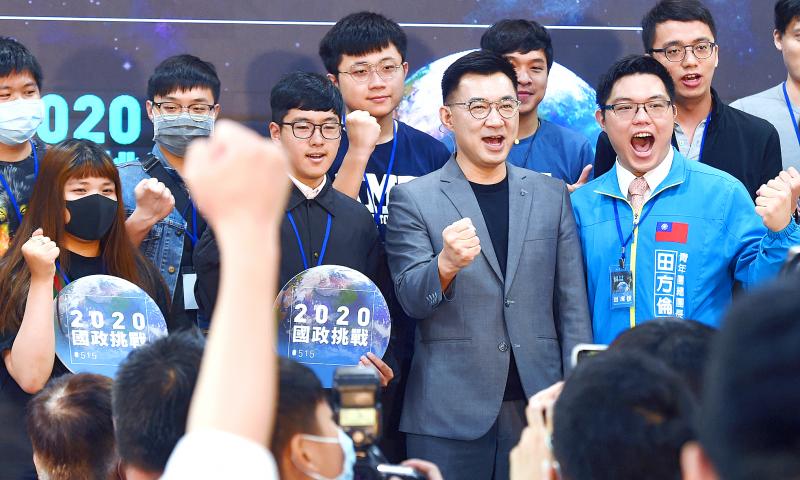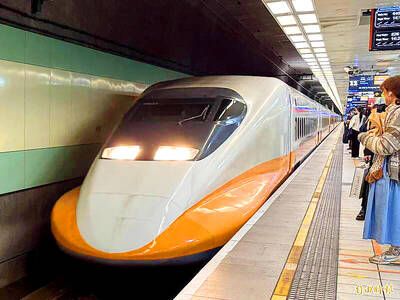President Tsai Ing-wen (蔡英文) scored low in 11 areas of national development over the past four years, Chinese Nationalist Party (KMT) Chairman Johnny Chiang (江啟臣) said yesterday, citing a KMT poll.
The TVBS poll center survey, commissioned by the KMT, asked respondents to rate Tsai’s performances in her first term from zero to 10, with six being a passing score and 10 the best, Chiang told a news conference in Taipei.
The results show that Tsai “barely passed” in areas such as social security, social welfare and environmental protection, with scores averaging above six, but below seven, he said.

Photo: Liao Chen-huei, Taipei Times
In categories for economic development, improving low wages, youth development and labor rights protection, the survey showed scores below six, he added.
She scored even lower for cross-strait and international relations, averaging about 5.5, Chiang said, adding that she performed worst in judicial reform, where she scored 4.96, an “absolutely failing grade.”
The overall satisfaction score for the Tsai administration was 6.17, which was probably due to the government’s successful response to the COVID-19 pandemic, he said.
As Tsai’s second-term inauguration approaches on Wednesday next week, Chiang said that he had five major items for her concerning Taiwan’s future, as the next four years would “only be harder” for her.
First, while global industrial supply chains are being reconstructed, and tourism is declining, he asked whether Tsai has medium to long-term plans other than bailouts to ensure Taiwanese industries adapt to global trends.
Second, how does Tsai plan to address employment issues for students graduating next month, as several corporations have been laying off staff or asking them to take unpaid leave due to the pandemic, he asked.
Third, Tsai should introduce solutions to address the declining birthrate, which is the root of a range of social problems, he said.
Fourth, amid heightened tensions between the US and China due to the pandemic, the Tsai administration has favored and depended on the US, when it should aim to take a neutral position, Chiang said, adding that he wanted to ask Tsai if it was the best diplomatic strategy for Taiwan.
Fifth, since the start of the pandemic, the KMT has upheld the principle of bipartisan collaboration and provided full support for the government’s disease prevention policies, he said.
However, the Democratic Progressive Party has opposed anything KMT-related over the past few months, Chiang said, adding that he wanted to ask whether she truly believes that collaboration between the ruling and opposition parties is the foundation of Taiwan’s democracy.
In response to questions about cross-strait relations, Chiang said that as chairman of the KMT, Taiwan’s only political party that has survived a war, he promised to stand on the front line to defend the nation, but it is also his responsibility to reassure Taiwanese that there is no risk of war.
Chiang also called on Beijing to acknowledge the existence of the Republic of China (ROC), where its “one country, two systems” mechanism would never sell, as well as to stop threatening the nation, because more oppression would only lead to more rifts between the two sides.
The KMT’s reform committee is discussing cross-strait policies, which are to be based on four principles: ensuring space for the ROC; upholding freedom and democracy; prioritizing the ROC; and guaranteeing safety and peace, he said.

The inspection equipment and data transmission system for new robotic dogs that Taipei is planning to use for sidewalk patrols were developed by a Taiwanese company, the city’s New Construction Office said today, dismissing concerns that the China-made robots could pose a security risk. The city is bringing in smart robotic dogs to help with sidewalk inspections, Taipei Deputy Mayor Lee Ssu-chuan (李四川) said on Facebook. Equipped with a panoramic surveillance system, the robots would be able to automatically flag problems and easily navigate narrow sidewalks, making inspections faster and more accurate, Lee said. By collecting more accurate data, they would help Taipei

TAKING STOCK: The USMC is rebuilding a once-abandoned airfield in Palau to support large-scale ground operations as China’s missile range grows, Naval News reported The US Marine Corps (USMC) is considering new sites for stockpiling equipment in the West Pacific to harden military supply chains and enhance mobility across the Indo-Pacific region, US-based Naval News reported on Saturday. The proposed sites in Palau — one of Taiwan’s diplomatic allies — and Australia would enable a “rapid standup of stored equipment within a year” of the program’s approval, the report said, citing documents published by the USMC last month. In Palau, the service is rebuilding a formerly abandoned World War II-era airfield and establishing ancillary structures to support large-scale ground operations “as China’s missile range and magazine

A 72-year-old man in Kaohsiung was sentenced to 40 days in jail after he was found having sex with a 67-year-old woman under a slide in a public park on Sunday afternoon. At 3pm on Sunday, a mother surnamed Liang (梁) was with her child at a neighborhood park when they found the man, surnamed Tsai (蔡), and woman, surnamed Huang (黃), underneath the slide. Liang took her child away from the scene, took photographs of the two and called the police, who arrived and arrested the couple. During questioning, Tsai told police that he had met Huang that day and offered to

BETTER SERVICE QUALITY: From Nov. 10, tickets with reserved seats would only be valid for the date, train and route specified on the ticket, THSRC said Starting on Nov. 10, high-speed rail passengers with reserved seats would be required to exchange their tickets to board an earlier train. Passengers with reserved seats on a specific train are currently allowed to board earlier trains on the same day and sit in non-reserved cars, but as this is happening increasingly often, and affecting quality of travel and ticket sales, Taiwan High-Speed Rail Corp (THSRC) announced that it would be canceling the policy on Nov. 10. It is one of several new measures launched by THSRC chairman Shih Che (史哲) to improve the quality of service, it said. The company also said